- Home
- Adele Griffin
Rainy Season Page 10
Rainy Season Read online
Page 10
I go back up to my room and fasten the lock on my door. My letter to Emily is dumb when I reread it. I can’t remember how I’d been planning to finish off the now-broken sentence I had started before Charlie interrupted me. I cross out the last sentence and write instead:
Now Charlie is missing because he went to beat up some dumb old kid. I have to think about how to get him home, so I’m signing off now.
With so much love from,
Lanie
When I tear out the letter I notice there’s almost no paper left, just a lot of scraggledy edges from where I’ve torn out pages. It scares me all of a sudden, seeing all those crooked jags where paper used to be. The book was so thick; I never thought I’d use all the paper. I close the journal and stare for a long time at the girl in the tulip who Emily said looked like me.
I fold the letter into an envelope, then take a long time writing Emily’s name on the front in calligraphy letters. Emily had taught me calligraphy when she got a set for Christmas, but I used to write it so blobby and messy. Once I wrecked one of her best calligraphy pens and she cried and didn’t talk to me all day. I can still see that pen, its smushed-up tip dripping over with blue ink from where I pressed too hard. She had called me a klutz, but that was a long time ago and now I have my own pens and I’m very good. Very very careful. I replace the journal under my mattress and set the envelope on the corner of my desk to let the ink dry.
“Where are you, Charlie?” I ask out loud. Cars have been pulling up to the house, doors thud shut, and voices of men and women are laughing and calling out each other’s names as their footsteps clack up to our house. Dad has turned on the hi-fi, and soon the house is steaming over with the energy of people who want to dance and talk and eat too much.
I lie on my bed and pick up my Nancy Drew book. The jewel smugglers just found out that Nancy is not a belly dancer, but a girl detective, and so now they’re in hot pursuit. I work to focus on the printed words, but the downstairs is becoming way too noisy. Mom and Alexa have returned, I hear Alexa shout—“We found them, and we bought hundreds!” and then the voices slowly begin sliding over to the outside of the house as people gather on the porch. Dishes and glasses clatter and clink and everyone’s all mouth to me, laughing and talking and eating.
I try to identify voices. I hear Dee and then Ted, but I don’t want to leave my room and say hi. Ted and his other group of Zonie friends can move into the land of adults in a way that makes me feel like a dorky military kid.
I hear a tapping on my door.
“Come in.” The door opens a little and Mom’s face peeks through the slivered space. Her cheeks are pink.
“Lane, if it gets too loud, and you and Charlie want to, then Mrs. Davidson says you both can sleep at their house next door in their spare room.”
“Okay, maybe I will.”
“Where’s Charlie?”
“Bathroom.” I look down at my book. “Good night Mom.”
“We found candles at this awful little store off the Tumba Muerto,” she says.
“It sounds like a big party, huh? Too many army wives?”
“Oh, they’re no big deal …” Mom’s smile reveals her teeth but not her thoughts.
“Well, good night then, Mom.” I look down. The page blurs in front of my eyes and I blink to refocus. Mom lingers and I feel her staring at me, unfixed about what else to say but not wanting to leave me just yet.
“So remember to tell Charlie when he comes out of the bathroom. About the Davidsons.”
“I will.”
“But check in with me if you do go, so I know.”
“Yep.”
“Good night, Lane. Love you.”
“Love you, too.” I look up to smile at her pink-cheeked smile but she’s already shut the door.
15
AFTER NANCY ESCAPES THE jewel thieves and is reunited with her father, the distinguished attorney Carson Drew, I get up and walk into the bathroom to brush my teeth. A moth bats against the fluorescent lighting; its blue-white tract hums along with the moth’s bump and whirring. I shove open the bathroom window and switch off the light.
“Stupid moth,” I say. “Shoo.” Maybe the moonlight is bright enough to draw the moth back outside. But when I switch back on the light, the stupid moth hasn’t moved, and starts its dance again. “Your funeral,” I tell it, trying to sound casual, but in my heart I’m worried. I brush my teeth quickly so that I can turn the light off again, and when I come back to my room Ted, changed into a nonwrinkled shirt and shorts, is sitting on my bed reading my book.
“You are a Nerd with a capital N,” he says, grinning. “How many of these Nancy Drews do you read a week?” He tosses me the book, which I catch and hold against my chest.
“As many as the library lets me have. Are Hans and Court here?” Hans and Courtland are Ted’s two older friends from the Zone. They’re Ted’s best Zone friends—sophomores in high school—and they’d only ever talk to me if Ted were around. I’m actually pretty scared of them, and if they’re roaming through my house I need to be forewarned.
“Yep, the two stooges—out on the porch being buffoons, lying to your mother and my mother about how good they’re doing in school. Where’s Port Charlie?”
I can’t answer with a lie and I can’t answer with the truth so I don’t say anything.
“Are you deaf?”
“He went for a walk.”
“At nine o’clock at night? Where did he have to go walk to?”
I don’t answer, but I’m relieved. Ted’s guessed immediately.
“Oh, don’t even tell me. He went to the other side to do some damage to the fort, right?” Ted stands up and exhales so hard that I see his nostrils flare out. “When did he leave?”
“Forty minutes ago.”
Ted checks his watch. “Okay, so we’ll wait half an hour and then go get him. I’m going to give myself the benefit of thinking all that’s really going to happen is that Charlie’ll run all the way over to the other side, kick the side door of the fort a few times, throw a few mangoes at the tree, and run home with his arms in the air like Rocky. Safe bet?”
“I guess so. See, some boards of our fort fell down—from the rain I guessed—and Charlie’s all mad, thinks it was Jason McCullough behind it.”
“Yeah, I stopped and looked at our fort with Court and Hans on the way over. It’s easy to fix, plus those guys want to work on it, too. We’re going to double-enforce it with two different kinds of wood.”
“Um, good.” I wind my hair up off my neck and nervously start twisting it into a crooked braid. If Hans and Court are planning to work on the fort, then there won’t be any room for girls—except maybe girls like Steph. It’s a depressing thought. “I guess we can wait half an hour.”
“Have you eaten? Great food tonight. Better than last night’s spread at the Horowitzes’.” Ted slips his fingers back through his hair. “Do I look okay? Jennifer Elwig’s here.”
“She’s a junior in high school, big shot. Two grades over you.” I reach up and pluck a piece of fuzz off his shirt collar. “You look okay for a dork.”
“Come out and chow down with me when you’re tired of reading,” Ted messes up my hair with both hands. “And don’t freak out about Charlie. He always comes home eventually, right?”
“Right.”
And then Ted is gone. Now I feel like a prisoner in my room, knowing that Hans and Courtland are tracking through my house in their big basketball sneakers, their mouths full of food and critical comments.
Hans and Courtland and most Zonian kids over age fourteen show up at any party they can get to on-base, because basically all Zonians do almost everything together. Dad says it’s ridiculous that the Zonian adults and kids go to the same parties. The typical schizophrenia, he says, of people who have no true culture.
After forty-two minutes of trying to read and then sketching lopsided old wedding dresses—I am definitely rusty at my drawing—I can’t stand it anymore. I’ll h
ave to face the party to retrieve Ted so we can find Charlie.
“Of course it’s not like anything really bad will happen to him,” I mutter to steady my nerves. “Nothing bad will ever really happen if I think through all the possibilities of what might happen.”
“Well, Lane, what are you doing still up?” asks Mrs. Wagner when I slink down the hall. She sits in the middle of a packet of army wives in a circle of chairs that have been rearranged in the living room. Their dinner plates are balanced neatly on their knees, their heads and shoulders are all hunched forward and drawn in together like spokes of a tepee.
“Hi, Mrs. Wagner. I’m just about to go to bed now. Hi, everyone.” The army wives murmur and smile and dip their heads. Aside from their whispering campfire, no one else is in the room.
“Well, your mama’s on the porch, honey, if you need her. And I think your dad’s in the den with the other men,” says a lady whose name I’ve forgotten from when I met her at the last party. Her thick glasses shrink her eyes to the size of little gerbil droppings.
“I’m actually looking for Ted Tie,” I answer. The lady frowns.
“Is he part of that group of kids from the Zone who are here? I just saw them all come in for more food at the buffet.” She cranes her neck to look into the empty dining room. “They’re not in there anymore.”
“I declare it’s a mighty strange thing, having these Zone kids running loose in an adult’s party,” mentions another wife with a clown-orange tan.
“Zonians keep clear of military, generally speaking,” Mrs. Wagner says in a voice that seems to mean that Zonians are awed and scared of military. Mrs. Wagner likes thinking that everyone’s awed and scared of military.
“Your friend is most likely out on the porch with all the other Zone people,” says gerbil eyes. “If you see your mother, tell her that Arlene White—Colonel White’s wife—would love to get hold of the recipe for that yummy steak marinate.”
“I will. See you later, then. Good night, everybody.” I speed away from the wives with a sigh of relief. If they ever knew that Mom had the party catered, they’d go on about it for weeks. Better just let Mom win a few good points with the wives and let them all think she’s some great chef.
16
I SEE COURTLAND AND Hans sprawled in on the wide doorframe of the sliding glass door that leads from the living room out to the porch. They’re rifling through an orange crate of Dad’s record albums and arguing about what to put on the hi-fi next. I skirt past them. I don’t want to ask them about Ted. Ted himself is nowhere in sight. My nerves rattle like a box of tacks. If Ted forgot and already left the party, then how will I find Charlie?
The candles keep away the mosquitoes but not the dark, so it’s hard to pick out faces as I scout through the crowd. It seems like hundreds of Zonians have willingly crunched themselves onto the porch so that they can be with just each other and away from the army wives. I strain my neck above the crowd and almost bump into Jennifer Elwig.
She raises her plucked-to-dental-floss-thin eyebrows high and stares down at me like she’s never seen me in her life. My face gets red, knowing I have to talk to her now, and I’m glad for the darkness.
“Have you seen Ted Tie?”
“What?”
I cough. “Ted Tie. Have you seen him anywhere?”
“It’s not like I’m exactly looking for him.” She yawns. Ted probably wouldn’t be happy to hear her say that. Jennifer shakes her long feathered hair back behind her head. “You’re Abby’s oldest kid, right?” she asks.
“Yeah.” I’m wondering if I should tell Ted what she just said, or if I should keep quiet.
“Abby’s a scream. She’s over there, if you’re interested.” Jennifer points to the far side of the porch and I can just glimpse Mom’s spiky hair behind a clump of other ladies.
“I’m looking for Ted actually, just Ted.”
“Why do you need him? Hey, you got a crush on him or something?” An annoyingly sly smile begins to expand over Jennifer’s face. “He’s a cutie.”
“I don’t even—I mean I would never ever even …” Jennifer’s smile flusters me. I want to think up something clever, something Nancy Drewish, to say back to her. “Oh, Ted’s just a chum.” I try to laugh cunningly like Nancy. “I wouldn’t even imagine—”
“Okay, whatever.” Jennifer’s already scanning the crowd for better company. I mumble goodbye and duck away from her, skating through the crowd. “Chum!”—how did I let myself say that? It seems normal when Nancy Drew says it, but in real life it’s completely dumb. I could kick myself. Dumb old Jennifer Elwig.
“Whoa, Lane, what are you still doing up?” Mom catches my arm as I slide by. No Ted, no Ted anywhere. Where could he have gone? “Are we getting too loud for you, sweetie? Are you going to the Davidson’s? Aren’t you tired? It’s getting late.”
“I was just … um.” I began to bite at the skin next to my fingernails. I’m tired. The weight of the day feels like it’s collapsing on me. It would be nice to go sleep at the Davidson’s, where it’s quiet.
“I was just telling Alexa and Dee and Greta about the time Mina and Pops had the butterfly party.” Mom’s talk is happy and loose; she pulls me next to her and I am caught in her story. The ring of Alexa and Dee and Greta’s faces shine with drop-mouthed smiles, ready to laugh. Mom knows how to tell lots of funny stories, but I’ve heard this one before. It goes like this: A long time ago, way before I was born, Mina and Pops had a big garden party and shipped in hundreds of butterflies from some foreign country, but on the day of the party, when they released them from the boxes, the butterflies flopped out into the air for about two seconds and then dropped dead on all the guests’ heads.
When Mom first told Emily and Charlie and me that story, I remember it was summertime and we were sitting around the kitchen table, even Dad, eating wild raspberries. Charlie and Mom had laughed so hard, red berry-mouthed laughs—but Emily started pounding her fists on the kitchen table, hollering, “Why didn’t anyone punch holes? Why didn’t anyone remember to punch holes in the boxes?”
She got up from the table and slammed herself into the bathroom. Mom followed her and stood outside the bathroom saying, “Come on, please, Emmy, come out of there. It’s just a silly story. I’m sorry, Em. I should remember about you and animals,” while she and Dad made funny faces at each other like, isn’t she crazy? I just sat in my chair, splitting a raspberry seed between my teeth, feeling bad and keeping quiet.
Now I wonder if Mom remembers about Emily and the bathroom when she tells the butterfly story.
Alexa and Dee and Greta all end up laughing, but Greta keeps repeating oh, that’s terrible, that’s too terrible. Mom laughs, too, from the sheer comfort of talking about Virginia. Her million everyday wishes and casual memories spring from the root of her homesickness. I know this is true without her having to say anything to me. I hear myself tell stories about Rhode Island the same way.
“Mom, I have to go,” I whisper, unlatching her arm from around my waist. “I have to find Ted.”
Dee hears me. “Where is that son of mine?” she demands. “He’d been hotfooting to get over here to see Jenny Elwig and now there she is by herself, looking just as snide and snotty as her mother.”
“Ted’s our boy.” Alexa sips her drink, careful that her coral lips don’t press the rim of the glass. “He’s playing it smooth.” The women sigh with laughter. My gaze laps once more around the porch and then I retreat inside. The skin around my fingernails is chewed raw.
I check the den, filled mostly with men, some of whom are smoking Dad’s nasty Colombian cigars. The fumes choke me even from the doorway. It’s easy to tell the army men from the Zonians because the army men wear short sleeve shirts or T-shirts with their shorts or jeans but the Zonian men wear the traditional pleated and hand-smocked guayabera shirt, in either white or pale blue.
Turnip-nosed Captain Jacobs holds the floor. He reminds me of that part in the Santa Claus poem, about the smo
ke encircling his head like a wreath, except that Captain Jacobs never looks like a right jolly old elf; more like a right drunk jerk.
“I understand Carter wanting to phase it back to them eventually,” he’s puffing. “But why now, when they can’t even pay out their debt to us? This country’s so poor—it’s never gonna cover upkeep of running the locks without our help.”
The room fills with quarrelsome voices as everyone starts competing to explain their dumb old philosophies about the Canal; what it means to the world, who it really belongs to, blah blah blah.
I stand quietly and listen to this same old argument I’ve heard so many times since we moved here; who should control the Canal? Dad’s quiet, too. He swallows long from his drink and then blinks down at its surface, probably trying to figure out the right way to present his opinions; it’s another way we’re alike, I guess.
“Hey Dad,” I call to him. He looks up to where I am haunting the doorway. For a moment his face is all bewildered, like he can’t quite remember who I am. Then he frowns at me and mouths, “Go to bed.”
“Dad have you seen—?”
“Now.” He swings his arm loosely in my direction and his voice is loud enough to switch the focus of some of the others.
I give up and escape from the smoke and argument.
17
MARITA SITS IN THE one chair of her room off the kitchen, folding laundry. Her eyes are bloodshot and her hair is starting to slip out of its ponytail. I notice she changed back into her cut-off jeans shorts and tank shirt. Linda is lying on Marita’s bed, asleep in her now crumpled beige uniform. When I enter her room after knocking, Marita touches a finger to her lips and tilts her head toward Linda.
“You are sunburned,” Marita whispers. I bring my warm fingers to my warm face and nod. Even at night, the sun figures out a way to sneak into my skin.

 All Pets Allowed
All Pets Allowed Witch Twins Series
Witch Twins Series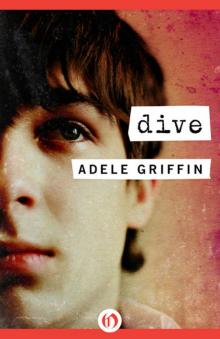 Dive
Dive V is for...Vampire
V is for...Vampire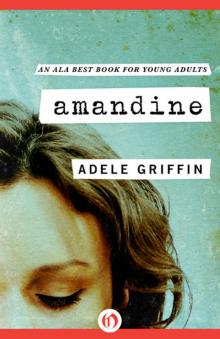 Amandine
Amandine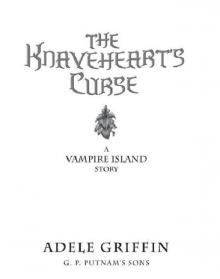 The Knaveheart's Curse
The Knaveheart's Curse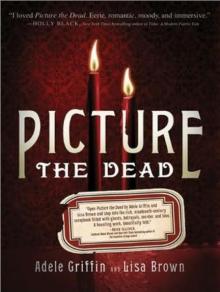 Picture the Dead
Picture the Dead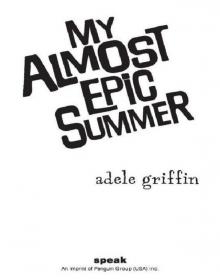 My Almost Epic Summer
My Almost Epic Summer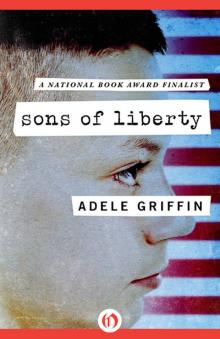 Sons of Liberty
Sons of Liberty Overnight
Overnight Witch Twins
Witch Twins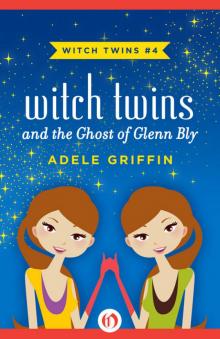 Witch Twins and the Ghost of Glenn Bly
Witch Twins and the Ghost of Glenn Bly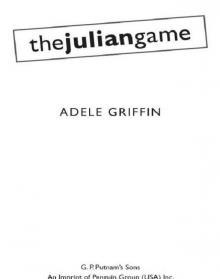 The Julian Game
The Julian Game Other Shepards
Other Shepards Split Just Right
Split Just Right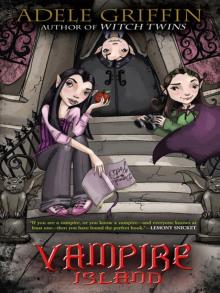 Vampire Island
Vampire Island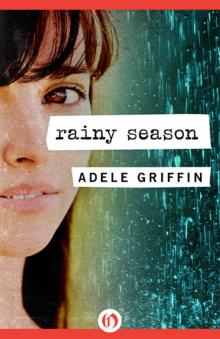 Rainy Season
Rainy Season Hannah, Divided
Hannah, Divided Where I Want to Be
Where I Want to Be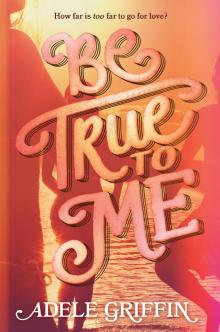 Be True to Me
Be True to Me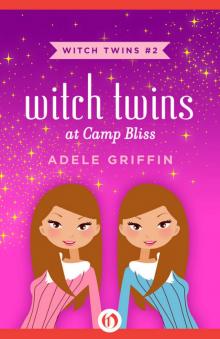 Witch Twins at Camp Bliss
Witch Twins at Camp Bliss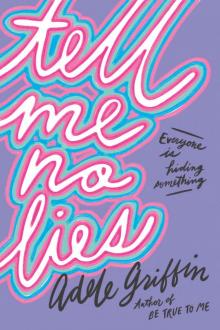 Tell Me No Lies
Tell Me No Lies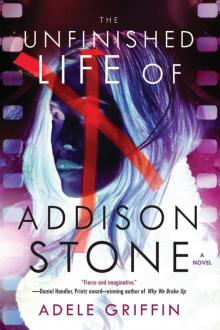 The Unfinished Life of Addison Stone
The Unfinished Life of Addison Stone